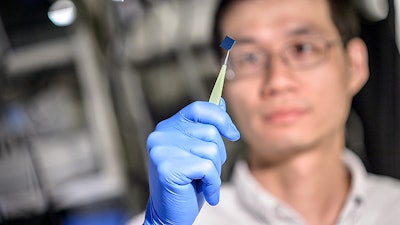
Purdue University and Ivy Tech Community College are partnering to help meet the future workforce needs in microelectronics, a field that is expected to add more than 100,000 workers over the next decade.
The agreement will provide a variety of collaborative educational opportunities for faculty and students in microelectronics and will explore ways to attract more talent to this area.
Mung Chiang, executive vice president for strategic initiatives for Purdue, said both institutions are ready to make a material impact on the future of the semiconductors industry in Indiana and across the U.S.
“The Purdue-Ivy Tech partnership will enable a comprehensive, robust solution to address the microelectronics needs across the entire workforce value chain, from associate to doctoral degrees,” said Chiang, the John A. Edwardson Dean of the College of Engineering and the Roscoe H. George Distinguished Professor of Electrical and Computer Engineering. “Considering the more than 70,000 students at each institution, this is virtually the largest partnership between a university and a community college for talent pipeline – perhaps the ultimate supply chain – in tech space.
Ivy Tech President Sue Ellspermann said, “Ivy Tech’s mission is rooted in workforce alignment, and we are pleased to partner with Purdue to address this need. The state of Indiana and industry win when institutions of higher education partner to provide economic and workforce development solutions.”
Purdue is a national leader in microelectronics devices and packaging research, spanning the semiconductor ecosystem in software and hardware. The demand for microelectronics increased by 26.2% in 2021. But while the U.S. consumes about half of the chips produced worldwide, only about 12% are manufactured in the U.S.
Under terms of the agreement, Purdue and Ivy Tech will collaborate on a number of areas related to semiconductors and microelectronics, including:
- Development of corporate training programs for industry-driven credentials, including certificates and certifications.
- Curriculum for associate and bachelor’s degrees.
- Outreach in high schools to increase interest in microelectronics for prospective students and develop career pathways and potential dual credit.
- Efforts to attract semiconductor companies to Indiana and place students in well-paying jobs.
The collaboration also will focus on internet opportunities to expand the potential workforce by creating access to online courses and deploying virtual training tools. This will contribute to the need to rapidly scale up training programs.
Purdue already has established excellence in key research areas considered critical to national security, including microelectronics. The area is among the critical topics under Purdue’s Next Moves, recently announced strategic initiatives that will advance the university’s competitive advantage.
The agreement is the latest piece of Purdue’s continually expanding research and development in the field of microelectronics and semiconductors.
The university recently highlighted its ongoing Purdue partnership with the Semiconductor Research Corp., pairing academia with industry to further microelectronics research.
Peter Bermel, the Elmore Associate Professor of Electrical and Computer Engineering, leads the SCALE (Scalable Asymmetric Lifecycle Engagement Microelectronics Workforce Development) program, which brings faculty across the Purdue College of Engineering together with faculty from 16 universities, the U.S. Department of Defense, NASA, the Department of Energy’s National Nuclear Security Administration labs and the defense industry to create a microelectronics workforce focused on national security needs.
Here is more on Purdue’s leadership in the area of microelectronics.
Microchips power the technologies used every day from cell phones, computers and cars to pacemakers, the internet and the electrical grid. Their power and affordability have steadily advanced, but the physical limits of standard design and production trends are being reached.
Ivy Tech already has worked with Purdue in a similar microelectronics effort that was submitted as a project for the Indiana Regional Economic Acceleration and Development Initiative (READI). Ivy Tech has also partnered with Purdue in numerous National Science Foundation grants, most recently in virtual reality projects.
The agreement between Purdue and Ivy Tech was signed this week and will remain in place for five years with the potential for renewal at that point.






















